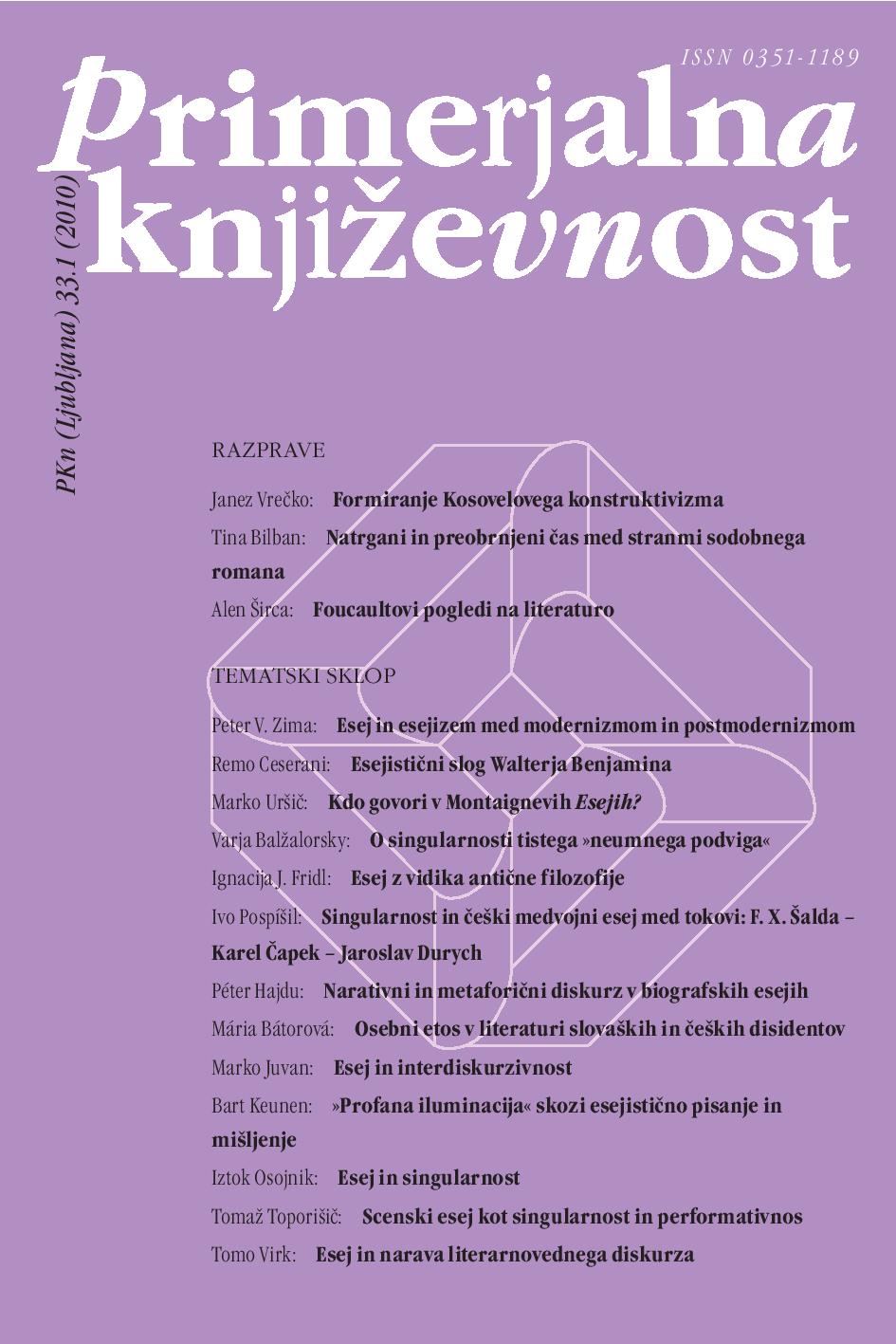The Essay and Interdiscursivity: Knowledge Between Singularity and Sensus Communis
Keywords:
literary genres, essay, singularity, interdiscursivity, aesthetic judgement, sensus communis, Rožanc, Marjan, Jančar, DragoAbstract
Knowledge is increasingly becoming organized by discipline; however, according to Lukács and Adorno, the essay genre represents a persistent need for discourses that distinguish themselves through transverse crossing of knowledge from various disciplines and through the testing of “specialized” generalizations in the complex “totality” of life experience. The oldest among such transversal discourses is literature, and in the modern era this has been joined by print media: newspapers and journalism. Literature produces and transforms knowledge through singularity; according to Attridge and Clark, literary texts are singular inasmuch as they configure information that cannot be translated into any conceptual system. On the other hand, newspapers and journalism are tending towards a level of translatability, generality, and doxa such as are established by public opinion through a generally accessible language. Both types of transversal knowledge – literary and journalism – are connected by a sensus communis in the logical and rhetorical sense of “generally known”, “common sense”, “that which is known or can be understood or experienced by everyone”, and also Kant’s sense of a “communal sense” (Gemeinsinn) as a necessary prerequisite for aesthetic judgment. – The etymology of the French word essai (including the sense “tasting”) evokes the sensory cognition implied in the concepts of the aesthetic and literature. Foucault saw the essays of Montaigne and Bacon as embodying the shift from the medieval commenting relationship toward traditional knowledge to the empirical and critical relationship from which modern science developed. However, the essay did not join the systematic drive of science, but persisted in the singularity of literary works. It interdiscursively confronted personal experience with various discursive fields, and shaped a fragmentary, perspectivized, and aesthetic mode of truth. Regardless of the literary singularity of the essay, which realizes Kant’s notion of the “aesthetic idea”, the genre also relies on the sensus communis. It developed from intertextual commentary on ancient loci communes, but its mode of knowledge is aesthetic: the essay absorbs the concepts of other disciplines and melds them into a “promiscuous” poetic semiosis, which, by producing ramified representations, evokes the complex totality of experience. On the other hand, essayists often tackle topics accessible to the “general reader”, and they are not immune to stereotypes and common sense. Since the eighteenth century, the essay has become established in newspapers, where it is has become susceptible to the ideologies of the day. The essay’s tension between the singularity of literarized existence and the ideologized knowledge of the (media) sensus communis is also evident in contemporary Slovenian examples (e.g., Marjan Rožanc and Drago Jančar).References
Adorno, Theodor W. »Esej kot oblika«. Prev. Mojca Savski. Beležke o literaturi. Ljubljana: Cankarjeva založba, 1999. 7–23.
Attridge, Derek. The Singularity of Literature. London in New York: Routledge, 2004.
Bacon, Francis. Eseji ali politični in moralni nasveti. Prev. Zdenka in Frane Jerman. Ljubljana: Slovenska matica, 1972. (Filozofska knjižnica 12).
Bahtin, Mihail M. Teorija romana: Izbrane razprave. Prev. Drago Bajt, ur. in sprem. beseda Aleksander Skaza. Ljubljana: Cankarjeva založba, 1982.
Bogataj, Matej: »Eseji, paberki, pisma bralca«. Literatura 19.187–188 (2007): 252–274.
Burke, Peter. A Social History of Knowledge: From Gutenberg to Diderot. Cambridge: Polity, 2000.
Clark, Timothy. The Poetics of Singularity: The Counter-Culturalist Turn in Heidegger, Derrida, Blanchot and the Later Gadamer. Edinburg: Edinburgh University Press, 2005.
Foucault, Michel. Les mots et les choses : Une archéologie des sciences humaines. Pariz: Gallimard, 1966.
Goltshnigg, Dietmar. »Essay«. Literaturwissesnchaftliches Lexikon: Grundbegriffe der Germanistik. Ur. Horst Brunner in Rainer Moritz. Berlin: Ercih Schmidt Verlag, 1997. 91–93.
Good, Graham. The Observing Self: Rediscovering the Essay. London in New York: Routledge, 1988.
Haas, Gerhard. »Essay«. Das Fischer Lexikon Literatur. Zv. 1. Ur. Ulfert Ricklefs. Frankfurt ob Majni: Fischer Taschenbuch Verlag, 2002. 611–627.
Jančar, Drago. Duša Evrope: članki, eseji, fragmenti. Ljubljana: Slovenska matica, 2006.
Johansen, Jørgen Dines. Literary Discourse: A Semiotic-Pragmatic Approach to Literature. Toronto: Toronto University Press, 2002.
Kant, Immanuel. Kritika razsodne moči. Prev. Rado Riha. Ljubljana: ZRC, 1999. (Philosophica, series classica).
Kay Baldwin, Tamara. »Newspapers in Europe after 1500«. The Function. Ur. Martin in Copeland. 89–102.
Lukács, Georg von. »Über Wesen und Form des Essays«. Die Seele und die Formen. Berlin: E. Fleischel, 1911. 1–39.
Martin, Shannon E. in David A. Copeland, ur. The Function of Newspaper in Society: A Global Perspective. Westport, CT: Praeger, 2003.
Martin, Shannon E. »Newspaper History Traditions«. The Function. Ur. Martin in Copeland. 1–12.
Montaigne, Michel de. »Izbor iz prve knjige Esejev«. Prev. Branko Madžarevič. Keria 10.2 (2008): 119–162.
Montaigne, Michel de. Eseji: izbor. Izbral in prev. Bogo Stopar. Ljubljana: Mladinska knjiga, 1960. (Kondor 39).
Poniž, Denis. Esej. Ljubljana: DZS, 1989. (Literarni leksikon 33).
Rožanc, Marjan. O svobodi in Bogu: izbrani eseji. Ljubljana: Mihelač, 1995. (Zbirka Brevir).
Schlaffer, Heinz. »Essay«. Reallexikon der deutschen Literaturwissenschaft. Zv. 1. Ur. Harald Fricke idr. Berlin in New York: Walter de Gruyter, 2007. 522–525.
Stephens, Mitchell. A History of News. 3. izd. New York: Oxford University Press, 2007.
Vogrinčič, Ana. Družabno življenje romana: uveljavljanje branja v Angliji 18. stoletja. Ljubljana: Studia humanitatis, 2008.


